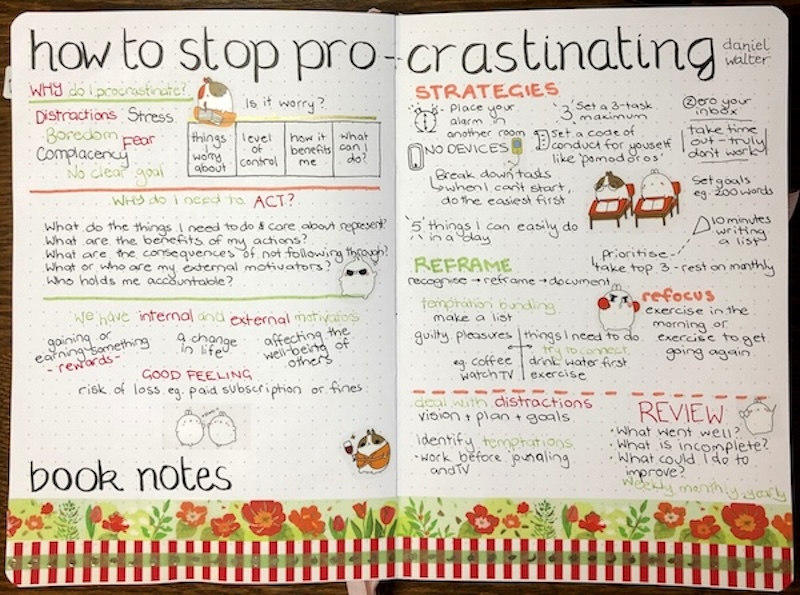My reading notes from the book by Daniel Walter
There are so many books out there about how to improve your productivity, all with their own theories on what will work best. For this reason, I find it’s worth trying out multiple ideas to see what works for you. There’s usually one or two ideas I take away from each book I read, or theories I try that end up being incorporated into my overall approach to planning and organising my life.
How to stop procrastinating by Daniel Walter provided a range of strategies for stopping procrastinating, or procrastibaking if you prefer. Some people even procrasticlean (not me!). I got the book free with my Kindle unlimited on Amazon. It may be available elsewhere as well.
I’ve been reading a few books and they have lots of great tips, so I’ve decided to create spreads in my journal to remember the key points and think through how I can implement them in my daily journaling. Below is my main take-aways from reading Daniel Walter’s book.

The book encourages you to first think through why you procrastinate. I found this useful, because it’s never clear why you are procrastinating. It’s a bit like feeling depressed – you sometimes have to work hard to understand the cause of it. People procrastinate for many reasons, such as stress, boredom or a lack of clear goals.
You follow this up by working out what motivates you – are you motivated by rewards? just feeling good? or because you want to do something for someone else?
Finally the book gives you a range of strategies. I’ve seen a few times that a good strategy for getting up in the morning is to have your alarm in another room. You really do need to set an intention the night before to get up, because it’s still very easy to get back into bed once you’ve turned off your alarm. I’ve done it while barely opening my eyes! The three-task maximum on your to-do list is often put forward as a strategy, but there are an equal number of books that say its not effective. I’ll have some good notes on that in the next book review I cover. One recommendation I totally agree with is zeroing your email inbox because an inbox full of unopened mail is very stressful. My worst experience was a period where I reduced my hours to two days a week to write my Masters thesis and my emails got out of control. If I’d stayed on top of them at the start, they might not have become overwhelming.
I like the temptation bundling method. It’s a method that encourages you to combine something you need to do with something you enjoy doing. I always have a drink of water while I’m making a coffee. After I take my dog for a walk I often tack on a ten-minute exercise afterwards, like a stretching routine or some pull-ups. While it’s easy to relax, I’m already dressed for exercise, so it’s a good time to do it.
Overall, I think the book had some useful strategies. I found it particularly useful for working out why I was procrastinating and what would motivate me to get on with things. Worth the read.
